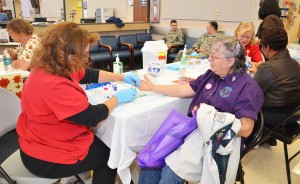The question of “what is high blood sugar numbers?” is a valid one. A person who has diabetes, heart problems, hypoglycemia or some other medical condition should carefully monitor his or her blood sugar level. If a person’s blood sugar level is more or less than what it should be, this could cause serious heart problems.
What is an Average Blood Sugar Range?
Medical website lifeclinic.com notes that the average person should have a blood sugar level ranging from 70 mg/dl to 120 mg/dl most of the time. Blood sugar up to 140 mg/dl is acceptable right before bedtime. However, each person is different and some people do have a different “safe range” than the one noted above. This range can vary for reasons such as age, family history, eating patterns, daily sugar intake and even ethnic background.
Consulting a medical professional is the only way for a person to establish his or her safe blood sugar average.
What are High Blood Sugar Levels for the Morning?
 The question of what’s considered high numbers for blood sugar in the morning, is difficult to answer across the board for everyone, but generally speaking a person should never have more than 200 mg/dl at this time.
The question of what’s considered high numbers for blood sugar in the morning, is difficult to answer across the board for everyone, but generally speaking a person should never have more than 200 mg/dl at this time.
It is interesting to note that even healthy people can expect to have high morning blood sugar numbers.
The reason for this is that your body produces extra blood sugar between three and eight in the morning. At the same time, hormones are released that lower your sensitivity to the high blood sugar level.
The fact that the body makes extra blood sugar for the morning is not bad; in fact, it helps to prepare the body for the day. However, if your blood sugar number is too high, it could indicate that he or she has out of control diabetes and/or needs to make some dietary changes.
High Blood Sugar Level Effects on the Heart and Lungs
 Along with the question of “What is high blood sugar numbers” you should also ask the question, “How does high blood sugar affect my heart?” Too much sugar in the blood will cause a person’s blood pressure to rise.
Along with the question of “What is high blood sugar numbers” you should also ask the question, “How does high blood sugar affect my heart?” Too much sugar in the blood will cause a person’s blood pressure to rise.
This can re![]() sult in heart palpitations, an inflammation of the membranes around the heart or even cardiac arrest. Research has determined that having overly high blood sugar for an extended period of time can and does impair lung function. It can make it more difficult for a person to breathe and can exacerbate a lung condition known as Chronic obstructive pulmonary disease, or COPD.
sult in heart palpitations, an inflammation of the membranes around the heart or even cardiac arrest. Research has determined that having overly high blood sugar for an extended period of time can and does impair lung function. It can make it more difficult for a person to breathe and can exacerbate a lung condition known as Chronic obstructive pulmonary disease, or COPD.
What Happens if you Ignore High Blood Sugar Numbers?
If you leave high blood sugar untreated, it can cause the body to start shutting down, organs to start being overworked and a person’s body to go into shock. If a person starts having high blood sugar numbers and leave them untreated or does not administer the proper amounts of insulin when needed the person can start showing symptoms such as :
- rapid heartbeat,
- stroke,
- dizziness
- and even can go into a diabetic coma.
Generally a high blood sugar number is considered high if the number falls over 150-177 range, but due to body mass, age and heredity the numbers can vary from person to person.
How Often Should I Monitor Blood Sugar Readings?
When a person is first diagnosed as being a diabetic they are asked to monitor their blood glucose readings very closely normally 2-3 times a day because this will allow the doctor and patient to determine what a high blood sugar number as well as a low number for that specific patient.
If the patient’s blood glucose numbers fall within those categories then they need to contact their doctor or seek treatment immediately, don’t let the symptoms go untreated for long periods of time because if so you could be doing more damage to your body than you realize.
Read about normal sugar levels for diabetics and non-diabetics HERE!
Final Thoughts on Blood Sugar Numbers
So the answer to the question “what is high blood sugar numbers?” is that any number over 120 mg/dl – 140 mg/dl is too high. However, a person who has just woken up should not be alarmed to find that he or she has very high blood sugar.
As with any medical diagnosis always listen to your doctor and follow his or her instructions, although it may be difficult, their advice can help save your life.

